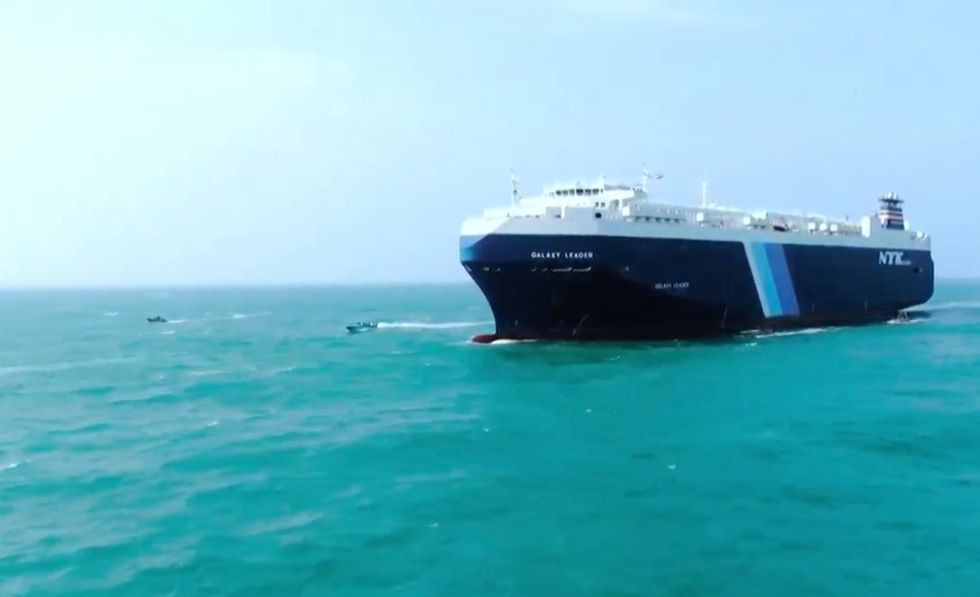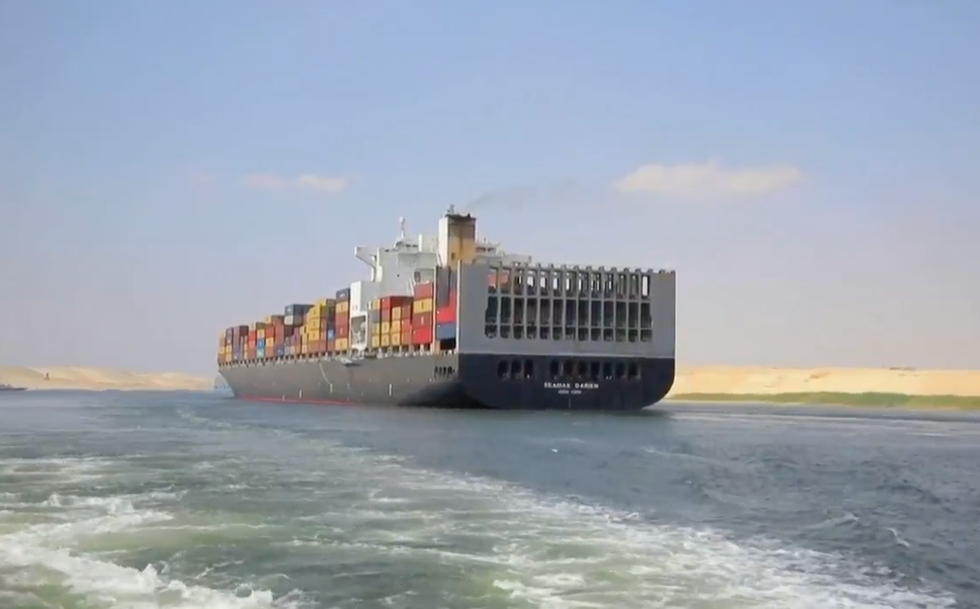New conflict risks crippling Britons with ANOTHER cost of living crisis - warning
An Iran-affiliated terrorist group wounded three US service members in a drone strike
Warring between Western and Iranian forces could block key oil supplies, forcing up inflation
Don't Miss
Most Read
Trending on GB News
A likely escalation between the West and Iranian proxies in the Middle East could put British lives and the economy at risk, security and finance experts have warned, amid fresh rocket and suicide drone barrages in Iraq and the Red Sea.
The heightened concern comes after US forces struck Iran-backed militias in Iraq after US forces in the north of the country were injured in a drone attack.
President Joe Biden ordered the retaliation after an Iran-affiliated terrorist group wounded three US service members in a drone strike, the Pentagon said.
Biden called for the strikes on “three locations utilised by Kataib Hezbollah and affiliated groups focused specifically on unmanned aerial drone activities,” National Security Council spokesperson Adrienne Watson said in a statement.

HMS Diamond is currently deployed in Gulf
Last night’s strikes on militias in Iraq is only the fourth time that Washington has ordered retaliation on Iranian-aligned groups in Iraq and Syria since the October 7 attacks, when violence in the region started to significantly escalate.
US forces in Iraq and Syria have faced over 100 drone, missile or shelling attacks from groups supported by the Tehran regime in the same period.
US Gen. (Ret) Joseph Votel, former commander of Central Command, told CBS Evening News that “Iranian-aligned militias on the ground in Iraq are continuing to push the boundaries and trying to identify where the red lines are for the Americans and in this particular case I think they found it.”
He added: “They are always pushing to try to see just how far they can go on.”
But there are fresh concerns today that this escalation represents a growing threat to British lives and interests.
Influential Irish economist Philip Pilkington told GB News: “The threat to shipping lanes has been present since early November but has been ignored until recently. Data shows that in the week before the US launched Operation Prosperity Guardian [the Gulf naval security force] oil shipments through the Suez Canal almost entirely ceased.
“If the American operation fails to defend shipping and another container is hit, there is every reason to think oil shipments will cease.”
He warned: “This will likely mean another spike in inflation and a second cost-of-living crisis for Britain.
“The economy — not to mention the British people — are already battered from the last round, and it is unclear how much more the country can take.”
Philip Ingram, a former senior British military intelligence officer, echoed these concerns: “What is happening across the rest of the Gulf region is a clear attempt by Iran, through proxies, to widen the scope of the Israel-Hamas war and turn it into a wider regional conflict.
He added: “That is why the international community is putting a huge military and diplomatic effort into trying to deter further escalation.
“What is worrying is Iran doesn’t seem to be listening.”
Ingram said that “British lives and interests will be at risk as will global interests.”
Analysts anticipate that the conflict will continue to escalate as the significant US naval presence in the Red Sea has failed to sufficiently deter Houthi drone and missile attacks.
American naval assets in the USS Eisenhower Carrier Strike group shot down 12 attack drones, three anti-ship missiles and two cruise missiles fired by Houthi rebels from Yemen, US Central Command said yesterday.
Centcom said that a destroyer and fighter jets shot down the Houthi weapons over a 10-hour period on Boxing Day.

Fears that the conflict could escalate into a wider regional exchange have heightened after the recent hostilities in the Red Sea and Iraq.
Washington has reportedly drawn up plans for strikes on Houthi infrastructure in Yemen.
Shashank Joshi, the defence editor of the Economist magazine, posted on X, formerly known as Twitter: “Prediction: there will be strikes on Houthi infrastructure in Yemen within a couple of weeks. This situation does not seem sustainable.”
Royal Naval destroyer HMS Diamond is supporting the US-led naval coalition and could be involved in future operations in the region.
Earlier this month, it shot down a Houthi missile fired towards Israel, the first time that the Royal Navy has intercepted a projectile in anger since the 1991 Gulf War.
When HMS Diamond joined the coalition, Defence Minister Grant Shapps said that the Houthis’ “illegal attacks” were an “unacceptable threat to the global economy, undermining regional security and are threatening to drive up fuel prices.”
Analysts have warned that crude oil production could slow if the crucial Strait of Hormuz between Iran and Oman is shut due to increasing Iran-West violence.
Before Christmas, Goldman Sachs said: “A Hormuz closure could lead to large crude production shut-ins given a lack of large alternative export outlets.
“We estimate that oil prices in this tail scenario would rise 20 per cent in the first month of the interruption, and could become more extreme thereafter.”
Pilkington said: “There are no easy solutions here. Any military escalation may only make the situation worse, not better as it would likely create even larger disruptions. We can only hope that diplomacy can stabilise the situation in the Middle East and secure global shipping.”
The wider regional violence is unlikely to slow while the Israel-Hamas war rages on.
Last night, Israel’s chief of defence staff said that its war with Hamas in Gaza will continue for “many more months.”
Gen. Herzi Halevi said “there are no magic solutions” a day after Prime Minister Benjamin Netanyahu said that its fight was “not close to being over.”
Reports emerged this morning that the Israeli military is moving its ground forces into central Gaza.
The IDF said it struck over 100 targets yesterday as its bombing campaign continued across the coastal enclave.
More than 1.7 million displaced people are now registered in shelters in the south, the New York Times reported, adding that several hundred thousand people are now sleeping along roads and in open spaces due to a lack of provision amid the widespread displacement.








